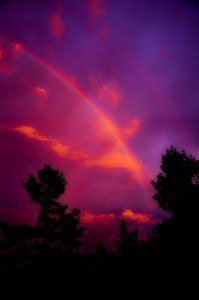
One of the things that can be confusing about trying to accomplish a lived spirituality is that the idea involves several concepts all at the same time. There are concepts that are so broad that they span all of creation and humanity and there are concepts that could focus on what you should do before breakfast tomorrow and what to think before you go to bed tonight.
The question becomes: Which concepts are most important? What should I learn first? What can I postpone? What do I have to do right now? You could go crazy trying to figure it all out. This might be the case even if you were immersed in Catholic Education your entire school life. I think it becomes all too easy in our technology-saturated world to believe that if we could only master the concepts surrounding a certain genre or skill that we can instantly become proficient in that area and never look back.
When we descend into confusion or hopelessness about our lack of progress in the spiritual life, we should remember this: Jesus kept it simple. He did not require an academic degree for his followers. As a matter of fact, some of them couldn’t even read or write. He was in close contact with the environs around him. He knew the touch of the earth on his feet, the sting of sea spray, the slap of rain on his face, the smell of sawdust, the flame of relentless sun on his skin and the jumble of the city noise in his ears. He was immersed in the world quite literally. Jesus was in intimate contact with every aspect of God’s creation. He was not apart from any of it. As a matter of fact, God gave us specific directions about how important being in touch with his creation was:
“Have dominion over the fish of the sea, the birds of the air, and all the living things that move on the earth… I give you every seed-bearing plant all over the earth and every tree that has seed-bearing fruit on it to be your food; and to all the animals of the land, all the birds of the air, and all the living creature that crawl on the ground, I give all the green plants for food” (Gn 2:2-3).
In Luke 19 we are reminded that even the stones have knowledge of who God is and how He expects us to be present in his creation.
Clearly God meant us to be in intimate contact with every aspect of creation as part of His original plan. God’s universe does not exclude anything and it all works together to glorify him as well as move his will and love through the world. While we have become more “modern,” though, we have simply moved away from our relationship with creation. The idea of being immersed in what God has formed with his own hands and breath has become dimmer and dimmer. We are taught to regard all creation as a series of things, objects that we can manipulate for our own use. When was the last time you touched creation without a barrier? How recently have you been in a natural environment that is not a commercial park, resort, hotel or destination? The idea of a vibrating creation that is the tangible materialization of God’s will has become like a foreign language to us as a human race. We even pass off all of the cautions that the word of God is a living thing with a physical impact each time we come in contact with it.
Basically, spirituality is a course in learning God’s personal language for each of us. Close contact with every aspect of creation increases our ability to do that. If you want to know God, get to know the things he values. The closer we are to his created works, the easier it is to understand how to hear him. The more we separate and insulate ourselves the harder that becomes. Our hearing becomes dim.
“And so we end up losing a decisive capacity for perception. We risk losing our inner senses. …[We] naturally lose our ability to speak with him and to him” (Pope BenedictXVI, From Homily, Outdoor site of the Neue Messe, Munich, Sunday September 10, 2006).
As a modern society, we have fallen into the habit of doing everything we can to separate or protect ourselves from encounters with God’s world. It’s not a matter of reverting to pioneer living but rather practicing the wisdom to see that we are doing our best to dim the idea of creation around us. Our participation in all aspects of what God has created for us and put in charge of has benefits that we can’t get any other way. If we are serious about the best relationship possible with the creator we need to make sure that we are not working at creating a dimmer and dimmer reality around us. We have been charged to be seekers of the light not the ones who are obsessed with tamping down its brightness. Maybe you could work on your relationship with creation this Lent. You might be surprised by what you find.
Beautiful. This is why brilliant new schools like Wyoming Catholic College include outdoor leadership programs as part of their integrated Catholic curriculum! It’s going to be an amazing four years…
Thank you! An excellent reminder. Brenda and I worked many years with subsistence farmers in Brazil. As a group, they were no better or worse than any other, but they did have a deeper understanding (through nature) of God’s ways – that God works slowly, organically, letting little things grow into great ones over time. Blessings. Arthur